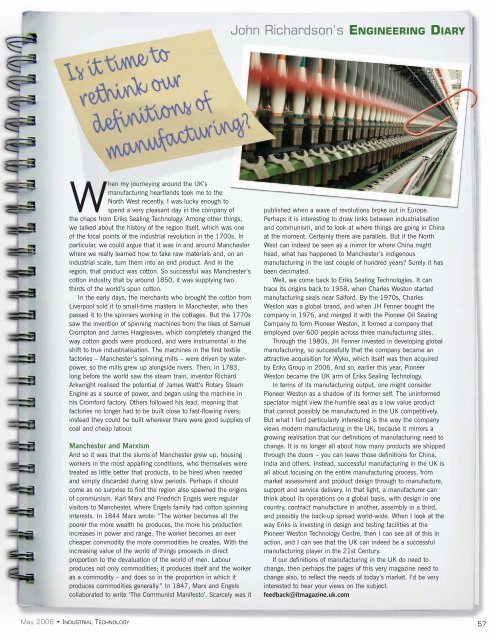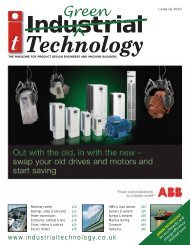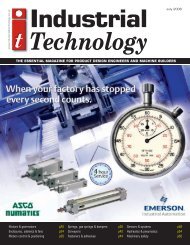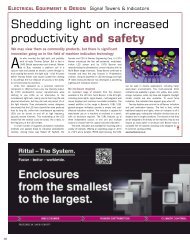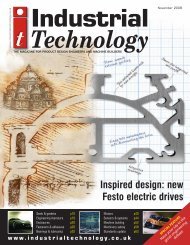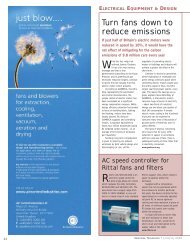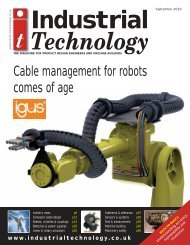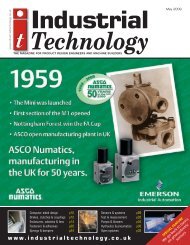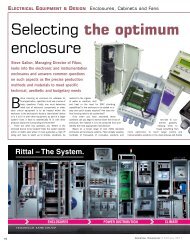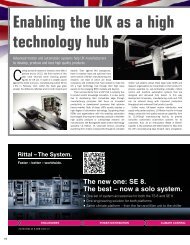sensors & systems - Industrial Technology Magazine
sensors & systems - Industrial Technology Magazine
sensors & systems - Industrial Technology Magazine
You also want an ePaper? Increase the reach of your titles
YUMPU automatically turns print PDFs into web optimized ePapers that Google loves.
John Richardson’s ENGINEERING DIARY<br />
When my journeying around the UK’s<br />
manufacturing heartlands took me to the<br />
North West recently, I was lucky enough to<br />
spend a very pleasant day in the company of<br />
the chaps from Eriks Sealing <strong>Technology</strong>. Among other things,<br />
we talked about the history of the region itself, which was one<br />
of the focal points of the industrial revolution in the 1700s. In<br />
particular, we could argue that it was in and around Manchester<br />
where we really learned how to take raw materials and, on an<br />
industrial scale, turn them into an end product. And in the<br />
region, that product was cotton. So successful was Manchester’s<br />
cotton industry that by around 1850, it was supplying two<br />
thirds of the world’s spun cotton.<br />
In the early days, the merchants who brought the cotton from<br />
Liverpool sold it to small-time masters in Manchester, who then<br />
passed it to the spinners working in the cottages. But the 1770s<br />
saw the invention of spinning machines from the likes of Samuel<br />
Crompton and James Hargreaves, which completely changed the<br />
way cotton goods were produced, and were instrumental in the<br />
shift to true industrialisation. The machines in the first textile<br />
factories – Manchester’s spinning mills – were driven by waterpower,<br />
so the mills grew up alongside rivers. Then, in 1783,<br />
long before the world saw the steam train, inventor Richard<br />
Arkwright realised the potential of James Watt’s Rotary Steam<br />
Engine as a source of power, and began using the machine in<br />
his Cromford factory. Others followed his lead, meaning that<br />
factories no longer had to be built close to fast-flowing rivers;<br />
instead they could be built wherever there were good supplies of<br />
coal and cheap labour.<br />
Manchester and Marxism<br />
And so it was that the slums of Manchester grew up, housing<br />
workers in the most appalling conditions, who themselves were<br />
treated as little better that products, to be hired when needed<br />
and simply discarded during slow periods. Perhaps it should<br />
come as no surprise to find the region also spawned the origins<br />
of communism. Karl Marx and Friedrich Engels were regular<br />
visitors to Manchester, where Engels family had cotton spinning<br />
interests. In 1844 Marx wrote: “The worker becomes all the<br />
poorer the more wealth he produces, the more his production<br />
increases in power and range. The worker becomes an ever<br />
cheaper commodity the more commodities he creates. With the<br />
increasing value of the world of things proceeds in direct<br />
proportion to the devaluation of the world of men. Labour<br />
produces not only commodities; it produces itself and the worker<br />
as a commodity – and does so in the proportion in which it<br />
produces commodities generally.” In 1847, Marx and Engels<br />
collaborated to write ‘The Communist Manifesto’. Scarcely was it<br />
published when a wave of revolutions broke out in Europe.<br />
Perhaps it is interesting to draw links between industrialisation<br />
and communism, and to look at where things are going in China<br />
at the moment. Certainly there are parallels. But if the North<br />
West can indeed be seen as a mirror for where China might<br />
head, what has happened to Manchester’s indigenous<br />
manufacturing in the last couple of hundred years? Surely it has<br />
been decimated.<br />
Well, we come back to Eriks Sealing Technologies. It can<br />
trace its origins back to 1958, when Charles Weston started<br />
manufacturing seals near Salford. By the 1970s, Charles<br />
Weston was a global brand, and when JH Fenner bought the<br />
company in 1976, and merged it with the Pioneer Oil Sealing<br />
Company to form Pioneer Weston, it formed a company that<br />
employed over 600 people across three manufacturing sites.<br />
Through the 1980s, JH Fenner invested in developing global<br />
manufacturing, so successfully that the company became an<br />
attractive acquisition for Wyko, which itself was then acquired<br />
by Eriks Group in 2006. And so, earlier this year, Pioneer<br />
Weston became the UK arm of Eriks Sealing <strong>Technology</strong>.<br />
In terms of its manufacturing output, one might consider<br />
Pioneer Weston as a shadow of its former self. The uninformed<br />
spectator might view the humble seal as a low value product<br />
that cannot possibly be manufactured in the UK competitively.<br />
But what I find particularly interesting is the way the company<br />
views modern manufacturing in the UK, because it mirrors a<br />
growing realisation that our definitions of manufacturing need to<br />
change. It is no longer all about how many products are shipped<br />
through the doors – you can leave those definitions for China,<br />
India and others. Instead, successful manufacturing in the UK is<br />
all about focusing on the entire manufacturing process, from<br />
market assessment and product design through to manufacture,<br />
support and service delivery. In that light, a manufacturer can<br />
think about its operations on a global basis, with design in one<br />
country, contract manufacture in another, assembly in a third,<br />
and possibly the back-up spread world-wide. When I look at the<br />
way Eriks is investing in design and testing facilities at the<br />
Pioneer Weston <strong>Technology</strong> Centre, then I can see all of this in<br />
action, and I can see that the UK can indeed be a successful<br />
manufacturing player in the 21st Century.<br />
If our definitions of manufacturing in the UK do need to<br />
change, then perhaps the pages of this very magazine need to<br />
change also, to reflect the needs of today’s market. I’d be very<br />
interested to hear your views on the subject.<br />
feedback@itmagazine.uk.com<br />
May 2008 • INDUSTRIAL TECHNOLOGY<br />
57


